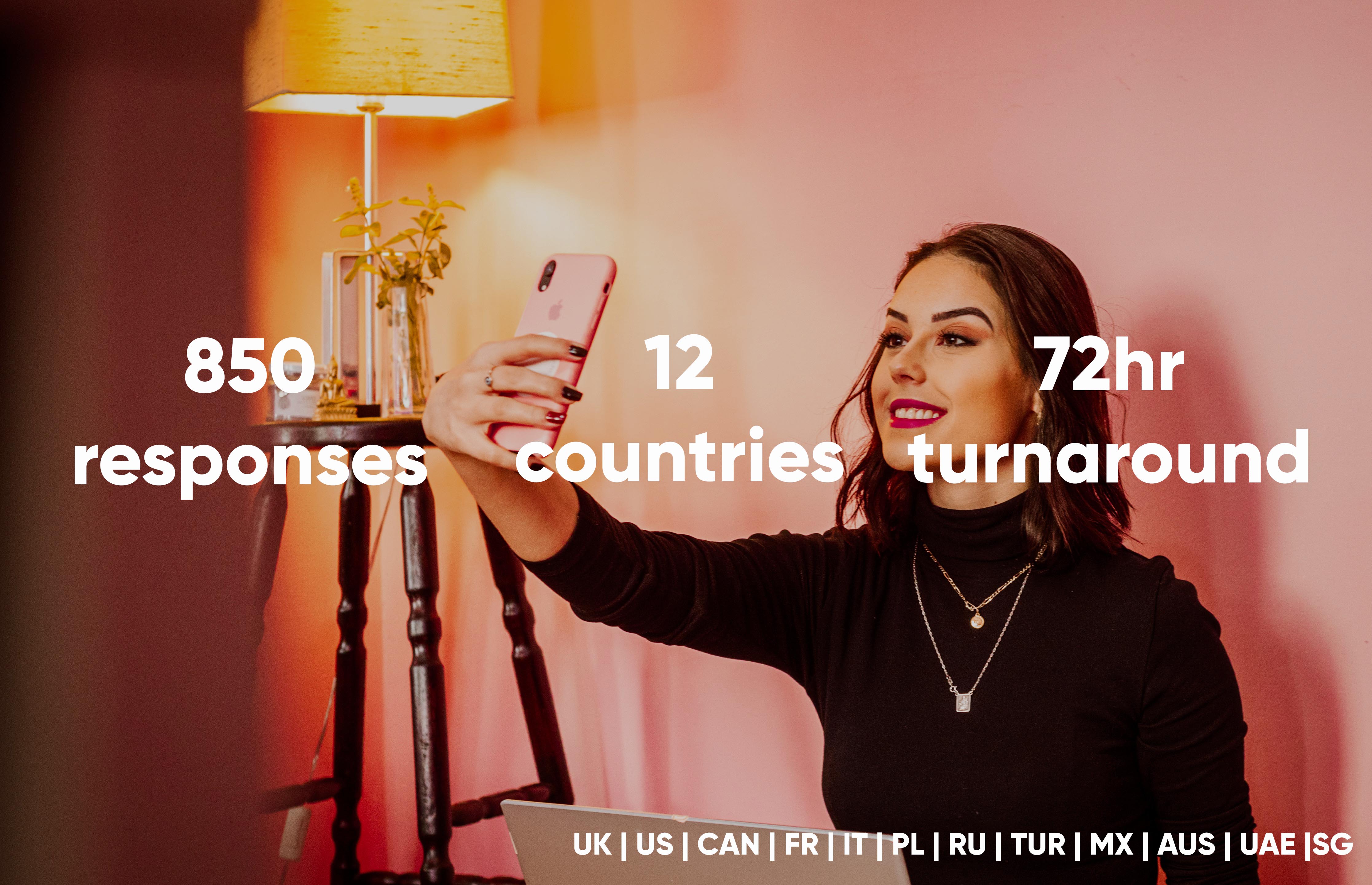It’s no secret that the ‘influence’ of influencers is dwindling. With a growing awareness of influencer marketing meaning 96% of us now mistrust influencers [YouGov], what once seemed like a covert ‘cool stamp’ has now become more like a paid celebrity endorsement. And as gen Z consumers become increasingly savvy to the realities of sponsored content, the smart brands are looking elsewhere for promotional content with cut-through.
So then, if we really are seeing the beginning of the end of influencer marketing, what’s next?
In the race towards a post-influencer world, the answer lies in customer communities. According to a recent study by CMX Research, 85% of brands believe building their own online communities is a direct route to improving brand experiences and fostering consumer trust. These customer communities don’t just act as feedback loops for brands, but can be utilised for advocacy and brand promotion – with the inherent benefit of peer-to-peer authenticity, as opposed to paid promotion via influencers.
We asked our global Bulbshare community where they go for endorsements that count. Whether they think influencers are still relevant and what authentic brand advocacy means to them? Here’s what they had to say…

Real-life advocates
Who are the most powerful influencers of all? ‘Your friends and family’, say our global communities. 76% of our users said their purchases are affected by their family and friends’ opinions – compared to only 38% who were affected by influencer opinions. Moreover, 86% reported being more likely to make a purchase based on the recommendations of family or friends over that of an influencer.
"If a brand is talked about and recommended by friends and family, I'm much more likely to buy it. I would also offer my opinion of brands I've had a good experience with to my loved ones."
Bulbshare user, Female, 45, 🇬🇧
"I never take notice of influencers at all and prefer to make my own purchase decisions or take recommendations from family."
Bulbshare user, Male, 25 🇨🇦
Trust and authenticity sadly lacking
Our consumers felt they could trust people they related to more than they could influencers: 30% thought influencers couldn’t be trusted at all and 36% could only see them as authentic under certain conditions. Furthermore, 51% expressed a negative emotional reaction when asked about trust and influencers.
Similarly, when asked what they thought about influencers in an open question, a fifth of our research communities mentioned money. Evidently, perceptions of materialism and greed polluted any faith our users had in influencers. Hence, the transparency and sincerity of peer opinion reigns supreme.
"I trust some of them - but not all because I think brands 'buy' their opinions..."
Bulbshare user, Female, 19 🇦🇺
“As long as they are being paid they will promote anything.”
Bulbshare user, Female, 32 🇫🇷
“Influencers are not objective.”
Bulbshare user, Male, 35 🇬🇧

Influencers during Covid: masking reality
This disdain at paid ambassadors was heightened during the pandemic. When asked whether influencers used their influence well during lockdown, our research communities answered that they felt the flaunting of wealth and flouting of rules was inappropriate. Terms such as ‘false lifestyles’ and ‘unrealistic images’ arose, as well as concerns about travelling despite restrictions.
Some respondents mentioned that there were still good examples of influencers, with themes such as ‘spreading positivity’, ‘keeping [followers] company’ and ‘distracting’ them from ‘the real world’ coming up.
“They are being paid to promote unnecessary things that not everyone can afford. They have also been going abroad when it's not deemed as essential travel and claimed ignorance when challenged about it. They brush it off as if the pandemic is nothing and does not affect them or their ‘work’.”
Bulbshare user, Female, 25 🇨🇦
“Generally, influencers do not influence me - they only entertain me. They can be good company.”
Bulbshare user, Male, 30 🇬🇧
“It can be refreshing to see positive content during a difficult time. However, I dislike some of them as they try to pressure people into buying things at a time when many have struggled with financial difficulty over the past few months due to coronavirus and wage cuts.”
Bulbshare user, Female, 27 🇬🇧
“I don’t follow influencers as I feel most of them give a false image of a lifestyle that is not reality. Sadly, young people look up to them and think this is how they should behave, rather than being themselves. I think the pandemic has just highlighted to people what’s important and therefore influencers are not so influential any more.”
Bulbshare user, Female, 22 🇬🇧
Cut through with quality
74% of our digital communities said that quality was the most important factor when it came to them recommending products – not the influencers associated with it (3%). They would happily promote a product that was made to a high standard. A genuine peer advocate talking about the quality of a product they have actually used is seen as the ultimate recommendation.
"To me, brand advocacy is having a great feeling about a brand because of who they are and sharing that with others."
Bulbshare user, Female, 30 🇬🇧
"I feel like it means someone fully supports a brand, their actions, beliefs and most importantly, their products. And they actively spread information and try to sell people on their brand."
Bulbshare user, Female, 27 🇨🇦

Getting it right with co-creation
Our communities noted Nike, Apple, JD Sports, The Body Shop, Ben & Jerry’s, The Meatless Farm Company, Oh Polly, Budweiser, Lush and PlayStation as brands they would like to work with and advocate for. When asked why, they all stated high quality products as the reason.
Notably, though, the brands our users were most enthused about were the ones that considered their customers with compassion: 92% of our global community expressed a positive perception towards brands who ‘co-create with their customers’ – with anecdotal responses telling us this lent a sense of a brand that cares about its customers’ thoughts, opinions and ideas.
"I care about brands that care about their customers! I love brands like Apple and everything they have to offer - and Body Shop, who are all about using natural products and sustainability."
Bulbshare user, Female, 23 🇬🇧
The solution to a post-influencer world
So, how do we harness the power of family and friend recommendations? The answer is consumer communities: everyday people reviewing products, sharing ideas and shaping brand decisions.
The future of brand advocacy means cutting out the middleman and getting straight to the consumers: invite them into your brand, become their trusted friend and give them a say in the products they consume.
“I enjoy having the ability to give my opinions and shape the brand’s future products.”
Bulbshare user, Female, 57 🇬🇧
Real life, relatable brand champions
88% of our communities were enthusiastic about collaborating with brands and 76% said they enjoy reviewing products. When the average consumer has such capacity to become a brand ambassador, it leaves a question mark over the future of paid influencer marketing. With authentic, trusted, unendorsed voices shouting about your brand in customer communities, there is little need to pay for false, paid-for voices.
“The customer is the boss - we pay for the products or services, so we should be listened to.”
Bulbshare user, Male, 46 🇬🇧
“Products developed with customers in mind are better because the consumers can come up with ideas the brand hasn't thought of to improve their product!”
Bulbshare user, Female, 56 🇦🇺

Hello, just wanted to mention, I loved this post. It was helpful.
Keep on posting!
I’m very happy to uncover this web site. I wanted to thank you for ones time
due to this wonderful read!! I definitely appreciated
every bit of it and i also have you book-marked to look at new stuff on your web site.
It’s not my first time to visit this site, i am browsing this website dailly and obtain fastidious information from
here daily.
my web site mega888 website
I just could not depart your site prior to suggesting that I extremely
loved the standard info a person provide for your guests? Is
going to be again incessantly in order to check up on new posts
Marvelous, what a web site it is! This webpage gives useful facts to us, keep it up.
Thank you for sharing your info. I really appreciate your efforts and I will be waiting for
your next write ups thank you once again.
Thanks for sharing your thoughts. I truly appreciate your efforts and I will be waiting for your
further write ups thank you once again.
Hey There. I discovered your weblog using msn. That
is an extremely well written article. I’ll make sure
to bookmark it and return to learn more of your
helpful info. Thanks for the post. I will definitely
return.
whoah this weblog is great i really like reading your posts.
Stay up the great work! You realize, lots of individuals are hunting around for this info,
you could help them greatly.
Great article! We will be linking to this great article on our site.
Keep up the good writing.
I’m very pleased to find this page. I need to to thank you for ones time for
this wonderful read!! I definitely appreciated every bit of it
and i also have you book marked to check out new information in your blog.
I enjoy what you guys tend to be up too. This kind of
clever work and exposure! Keep up the terrific works guys I’ve included you guys to our blogroll.
my site; lpe88 ios [918kiss-m.com]
Hi, just wanted to tell you, I liked this post. It was inspiring.
Keep on posting!
Here is my blog: joker123 pc download
Hi there! This post could not be written any better!
Reading through this post reminds me of my good old room mate!
He always kept talking about this. I will forward this post to him.
Pretty sure he will have a good read. Thanks for sharing!